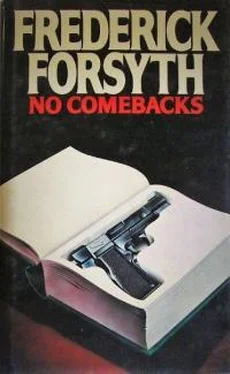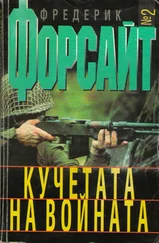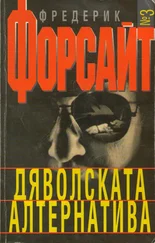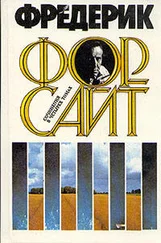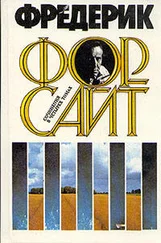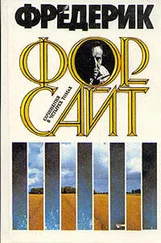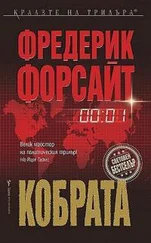'In a prisoner-of-war camp in Silesia,' said Hanley.
'Then,' said the professor, rising, 'he did not kill that woman and brick her up beside the fireplace. So who did?'
Hanley picked up the internal phone and called the detectives' room. The young sergeant came on the line.
'Who,' asked Hanley with deliberation, 'was the man who owned and occupied the house in Mayo Road prior to 1954 and died in that year?'
'I don't know, sir,' said the young man.
'How long had he been in it?'
'I didn't take notes about that, sir. But I recall the previous occupant had been there for thirty years. He was a widower.'
'He certainly was,' growled Hanley. 'What was his name?'
There was a pause. 'I never thought to ask, sir.'
The old man was released two hours later, through the back door in case anyone from the press was hanging around the front lobby. This time, there was no police car, no escort. He had the address of a council hostel in his pocket. Without saying a word, he shuffled down the pavement and into the mean streets of the Diamond.
At Mayo Road, the missing section of chain-link fence where the house had once been was in place, closing off the entire car park. Within the area, on the spot where the house and garden had stood, was a sheet of level concrete in the last stages of drying. In the gathering dusk, the foreman was stomping over the concrete with two of his workers.
Every now and then he hacked at the surface with the steel-capped heel of one of his boots.
'Sure it's dry enough,' he said. 'The boss wants it finished and tarmacked over by tonight.'
On the other side of the road, in the rubble field, a bonfire burned up the last of a pile of banisters, stairs, roof joists, ceiling beams, cupboards, window frames and doors, the remnants of the plank fence, the old privy and the chicken house. Even by its light, none of the workers noticed the old figure that stared at them through the chain-link wire.
The foreman finished prowling over the rectangle of new concrete and came to the far end of the plot, up against where the old back fence had been. He looked down at his feet.
'What's this?' he asked. 'This isn't new. This is old.'
The area he was pointing at was a slab of concrete about 6 feet by 2.
'It was the floor of the old chicken house,' said the worker who had spread the ready-mix concrete that morning by hand.
'Did you not put a fresh layer over it?' asked the foreman.
'I did not. It would have raised the level too high at that spot. There'd have been a fierce hump in the tarmac if I had.'
'If there's any subsidence here, the boss'll have us do it again, and pay for it,' said the foreman darkly. He went a few feet away and came back with a heavy pointed steel bar. Raising it high above his head, he brought it down, point first, on the old concrete slab. The bar bounced back. The foreman grunted.
'All right, it's solid enough,' he conceded. Turning towards the waiting bulldozer, he beckoned. 'Fill it in, Michael.'
The bulldozer blade came down right behind the pile of steaming fresh tarmac and began to push the hot mountain, crumbling like soft, damp sugar, towards the rectangle of concrete. Within minutes, the area had turned from grey to black, the tar raked flat and even, before the mechanical roller, waiting behind the spreaders, finished the job. As the last light faded from the sky, the man left for home and the car park was at last complete.
Beyond the wire, the old man tinned and shuffled away. He said nothing, nothing at all. But for the first time, he smiled, a long, happy smile of pure relief.
"PRIVILEGE", перевод Сергей Сухарев
Когда в воскресное утро в половине девятого зазвонил телефон, Билл Чедвик был еще в постели. Вставать не хотелось, но телефон не умолкал. После десятого звонка Билл заставил себя подняться и спуститься вниз, в холл.
– Да?
– Привет, Билл. Это Генри.
Звонил Генри Карпентер, живший по соседству. Они были знакомы, хотя и не на короткой ноге.
– Доброе утро, Генри, – сказал Чедвик. – Ты, видать, не любитель поваляться в выходной?
– Да нет… Я сейчас собираюсь в парк, на пробежку.
Чедвик хмыкнул. Еще бы! Не сидится ему на месте. Он зевнул.
– Чем могу быть полезен в столь ранний час?
На другом конце провода немного помолчали, затем Карпентер спросил:
– Ты уже видел утренние газеты?
Чедвик взглянул на коврик в холле, где лежали обе газеты, которые он выписывал.
– Нет, а что?
– Ты «Санди курьер» получаешь?
– Нет, – ответил Чедвик.
Наступила пауза.
– Я думаю, тебе следует взглянуть на сегодняшний номер, – проговорил Карпентер. – Там есть кое-что о тебе…
– О, – сказал Чедвик заинтересованно. – А что именно?
Карпентер как будто растерялся. Он позвонил в уверенности, что Чедвик уже в курсе и можно будет обсудить статью.
– Знаешь, старина, будет лучше, если ты сам на нее взглянешь, – промямлил он и дал отбой.
Чедвик был заинтригован. Ведь любопытно раскрыть газету и узнать, что о тебе пишут.
Он вернулся в спальню, захватив с собой «Экспресс» и «Телеграф». Вручив газеты жене, он прямо на пижаму надел брюки и пуловер с высоким воротом.
– Куда ты идешь? – спросила жена.
– Схожу на улицу, за газетой. Генри Карпентер говорит, что там обо мне написано.
– О, вот ты и прославился, – заметила жена. – Пойду приготовлю завтрак.
В киоске на углу еще оставалось два экземпляра «Санди курьер» – толстой газеты со множеством приложений. По мнению Чедвика, ее напыщенный слог предназначался для таких же надутых и высокомерных читателей. На улице было холодно, и, удержавшись от соблазна немедленно пролистать газету, он вернулся домой. На столе в уютной кухне уже стоял апельсиновый сок и кофе.
Принявшись за чтение, он вдруг сообразил, что Карпентер не назвал ему номера страницы. За первой чашкой кофе он бегло просмотрел новости; раздел культуры и искусства вообще не удостоил вниманием, пропустил и спортивную рубрику. Оставалась вкладка с цветными иллюстрациями и обзор деловой жизни. Чедвик вел небольшое дело в пригороде Лондона и поэтому, не взглянув на иллюстрации, сразу перешел к обзору.
Читать дальше
